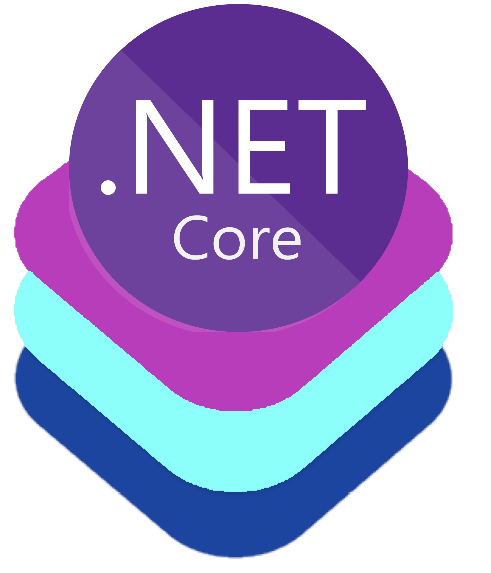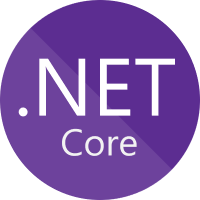15
FebWhat is .NET? A Beginner Guide to learn .NET in 2025
What is .NET?: An Overview
.NET is a free, cross-platform, and open-source programming framework that enables the development of various web, mobile, and cloud computing applications. This powerful open-source development platform has been driving the software industry for years. With every release of a new version, the technocrats become empowered to build more powerful, efficient, and secure applications. In this .NET tutorial, we'll understand the learning process of .NET from a beginner's perspective.
.NET Applications
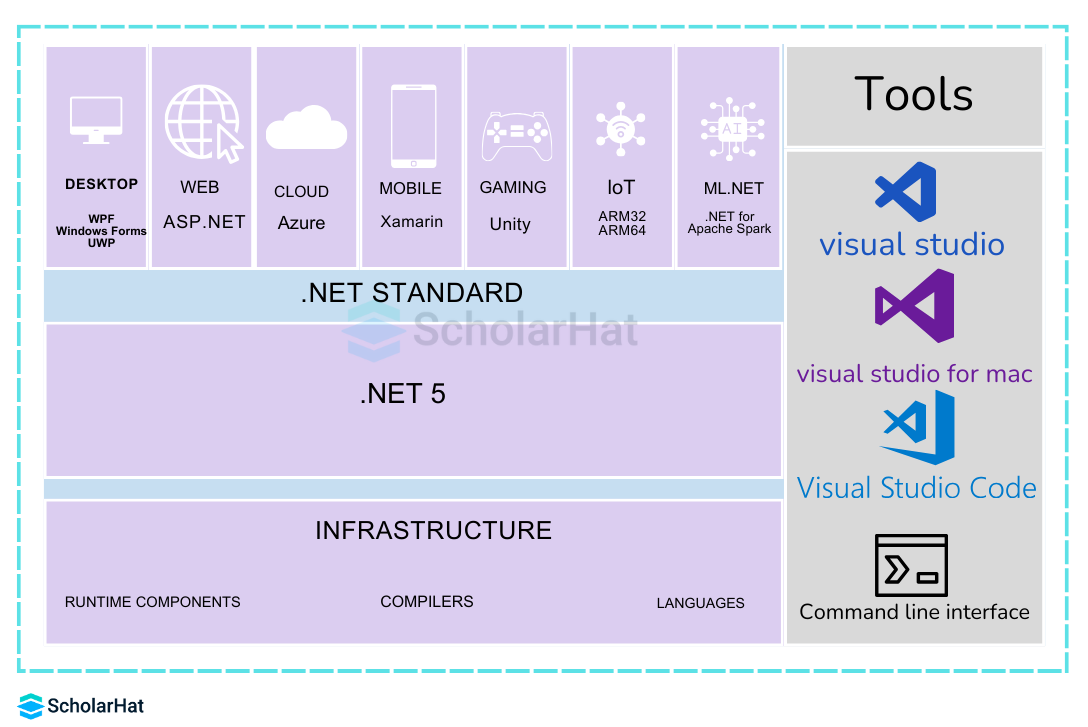
.NET applications refer to software programs and systems developed using the .NET framework. These applications can span various domains and platforms, including:
- Web Applications: .NET enables dynamic and scalable web application development using technologies such as ASP.NET, ASP.NET Core, and Blazor.
- Desktop Applications: .NET offers libraries like Windows Forms and WPF (Windows Presentation Foundation) for creating desktop applications that run on Windows operating systems. These applications can have rich user interfaces and interact with local resources.
- Mobile Applications: With Xamarin, developers can create cross-platform mobile applications for iOS, Android, and Windows using C# and .NET libraries. Xamarin allows code sharing across multiple platforms, reducing development time and effort.
- Cloud Services and Microservices: .NET Core and ASP.NET Core are well-suited for building cloud-native applications and microservices. Developers can leverage features like dependency injection, middleware pipeline, and container support to create scalable and resilient cloud applications.
- Game Development: Unity3D, a popular game development platform, supports C# scripting using the .NET framework. Game developers can use .NET to create interactive and immersive gaming experiences for various platforms, including PCs, consoles, and mobile devices.
- Enterprise Applications: .NET is widely used in the development of enterprise-level software solutions, including customer relationship management (CRM) systems, enterprise resource planning (ERP) systems, content management systems (CMS), and more.
- IoT (Internet of Things): .NET can be utilized for developing IoT solutions by leveraging frameworks like Azure IoT Hub and Azure IoT Edge. Developers can build applications that collect, process, and analyze data from IoT devices, enabling various IoT scenarios such as predictive maintenance, remote monitoring, and asset tracking.
Read More - Advanced .Net Interview Questions
Key Components of .NET
.NET includes the following components:
- Common Language Runtime (CLR): This runtime environment manages code execution, memory allocation, and resource handling. It provides features such as garbage collection, exception handling, and code security, ensuring reliable and efficient application performance.
- Base Class Library (BCL): It consists of fundamental types, classes, and functions that are essential for developing applications across various platforms and domains.
- .NET Framework Class Library (FCL): is a collection of pre-built classes, methods, and components that developers can leverage to expedite application development. It extends the functionality of the BCL and provides higher-level abstractions for specific application development tasks.
- Languages and Compilers: .NET supports multiple programming languages, including C#, VB.NET (Visual Basic .NET), F#, and more. Each language is supported by its own compiler and toolchain, enabling developers to choose the language that best suits their preferences and project requirements.
- Integrated Development Environments (IDEs): Visual Studio is the primary IDE for .NET development, offering a rich set of tools, editors, debuggers, and project management capabilities for building .NET applications.
- ASP.NET and ASP.NET Core: ASP.NET is a web application framework for building dynamic and interactive web applications and services using .NET.
ASP.NET Core is a cross-platform and open-source framework that is optimized for modern web development, offering improved performance, scalability, and flexibility compared to traditional ASP.NET.
- Entity Framework: It is an object-relational mapping (ORM) framework for .NET that simplifies data access and persistence by enabling developers to work with relational databases using object-oriented concepts.
- NuGet Package Manager: It allows developers to easily integrate third-party dependencies into their projects and manage package dependencies and versions effectively.
Why use .NET?
Multiple factors are behind such a rapid adoption of .NET. Some of them are:
- Productive: .NET offers advanced language features like generics, LINQ, and asynchronous programming, along with extensive class libraries and multi-language support for developers.
- Versatility: With .NET you can target any application type running on any platform. From mobile applications running on iOS, Android, and Windows, to Enterprise server applications running on Windows Server and Linux, or high-scale microservices running in the cloud, .NET provides a solution for you.
- Trusted and Secure: The .NET platform is officially supported by Microsoft and trusted by thousands of companies and millions of developers. Microsoft takes security very seriously and releases updates quickly when threats are discovered.
- Rich Ecosystem: .NET has a rich ecosystem of libraries, frameworks, and tools that streamline development, reduce code duplication, and enhance productivity.
- Performance and Scalability: The Common Language Runtime (CLR) provides features such as just-in-time (JIT) compilation, garbage collection, and optimized memory management, contributing to the performance of .NET applications.
- Loved by developers: .NET is a modern, innovative, open-source development platform and developers love it.
- Community and Support: .NET has a large and active developer community, supported by Microsoft and other organizations. Developers can access documentation, tutorials, forums, and community resources to learn, share knowledge, and troubleshoot issues.
History of .NET
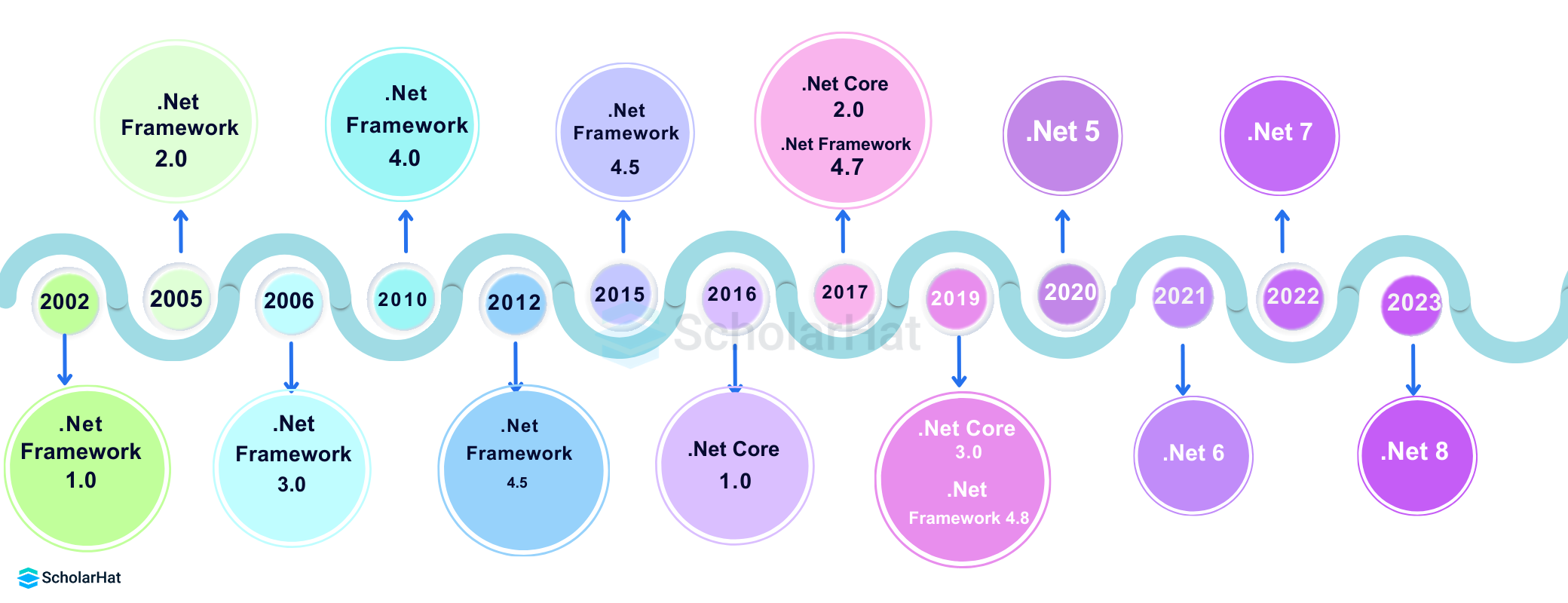
| Year | .NET Version | CLR Version | C# Version | Features and Enhancements |
| 2002 | 1.0 | 1.0 | 1.0 | Initial release – OOP support for Web development. |
| 2003 | 1.1 | 1.1 | 1.2 | Added support for ADO.NET classes for Oracle database and ODBC database connectivity. |
| 2005 | 2.0 | 2.0 | 2.0 | New CLR 2.0, Enhancement of ASP.NET & ADO.NET, Generics Types, Partial Types, Anonymous methods, Nullable Types |
| 2006 | 3.0 | 2.0 | 3.0 | Windows Presentation Foundation (WPF), Windows Communication Foundation (WCF), Windows Workflow Foundation (WWF) were introduced. |
| 2007 | 3.5 | 2.0 | 3.0 | Build-in-Support for AJAX, Language Integrated Query (LINQ) |
| 2010 | 4.0 | 4.0 | 4.0 | New CLR 4.0, Task Parallel Library (TPL), Managed Extensibility Framework (MEF), and Dynamic Language Runtime (DLR) were introduced in this release. |
| 2012 | 4.5 | 4.0 | 5.0 | Support for Windows Store, enhancements of WPF, WCF, WF, MEF, and ASP.NET. |
| 2013 | 4.5.1 | 4.0 | 5.0 | Performance and debugging improvements. |
| 2014 | 4.5.2 | 4.0 | 5.0 | ASP.NET API enhancements, New Workflow features, and Debugging improvements features were added in this release. |
| 2015 | 4.6 | 4.0 | 6.0 | New 64-bit JIT compiler, Assembly Loader improvements, enhancements to Garbage Collector |
| 2017 | 4.7 | 4.0 | 7.0 | High DPI support for Windows Forms controls, Touch support for WPF in Windows 10, Enhanced cryptography support, performance, and reliability improvements. |
| 2019 | 4.8 | 4.0 | 7.3 | JIT improvements, Malware scanning for Assemblies, and Accessibility Enhancements |
.NET Core Version History
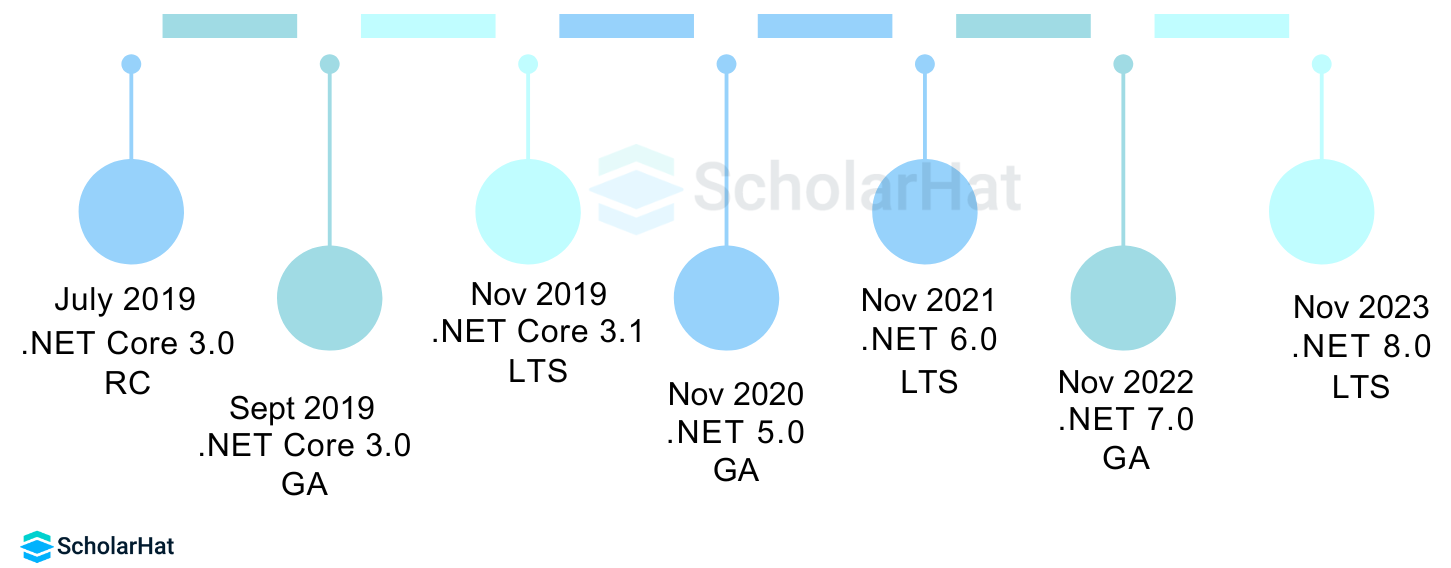
| Year | .NET Core Version | C# Version | Features and Enhancements |
| 2016 | 1.0 | 6.0 | Lightweight, cross-platform framework, featuring modular architecture, high performance, and command-line tools, alongside support for Linux, macOS, and Windows, and notable enhancements in security and runtime capabilities. |
| 2017 | 2.0 | 7.0 | Expanded platform support, and enhanced tooling, including improved compatibility with .NET Framework APIs, and integration with Visual Studio 2017 |
| 2018 | 2.1 | 7.3 | Improved build times and runtime speed, along with new features like Span<T> and Memory<T>, and enhancements to ASP.NET Core, Entity Framework Core, and SignalR |
| 2018 | 2.2 | 7.3 | New features such as endpoint routing in ASP.NET Core, improvements to Entity Framework Core, and enhanced Docker support |
| 2019 | 3.0 | 8.0 | Support for Windows Desktop applications, including Windows Forms and WPF, along with improved performance, enhanced support for C# 8.0 features, and new capabilities in ASP.NET Core, Entity Framework Core, and Blazor |
| 2019 | 3.1 | 8.0 | Long-term support (LTS) with performance improvements, enhanced JSON APIs, support for HTTP/2, and improvements in Blazor, Entity Framework Core, and ASP.NET Core |
| 2020 | .NET 5=.NET Core | 9.0 | enhanced support for cloud-native development, high-performance JSON APIs, and improved performance for web applications and services. |
| 2021 | 6 | 10 | .NET MAUI for cross-platform app development, enhanced support for cloud-native scenarios, and optimized runtime and tooling experiences for building modern applications. |
| 2022 | 7 | 11 | boasts performance boosts with native AOT and on-stack replacement while streamlining developer experience with improved CLI and Blazor WebAssembly support. |
| 2023 | 8 | 12 | Blazor web UI unification, and JSON enhancements, delivering faster, more versatile, and data-driven applications. |
.NET Standard vs .NET Framework vs. .NET Core
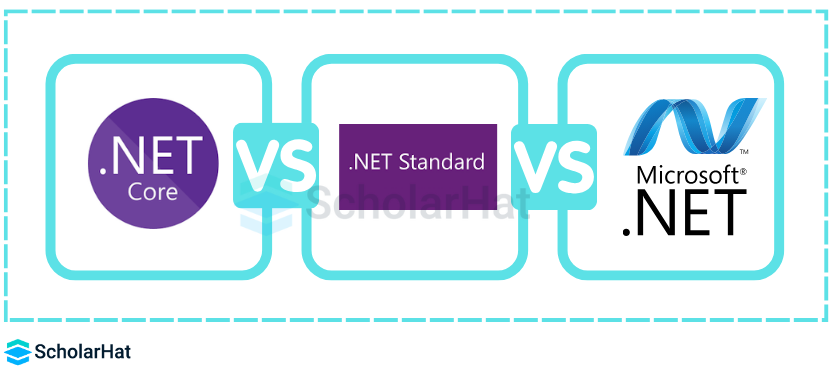
- .NET Standard
- It is a set of APIs and specifications that define a common set of APIs that all .NET implementations must support.
- It serves as a compatibility standard for ensuring interoperability and portability between different .NET implementations, including .NET Framework, .NET Core, and Xamarin.
- By adhering to the .NET Standard, developers can write libraries that can be used across different .NET implementations without modification, reducing compatibility issues and simplifying code reuse.
- .NET Core
- .NET Core is a cross-platform, open-source version of the .NET framework developed by Microsoft.
- It is designed to be lightweight, modular, and flexible, with support for building and running applications on Windows, Linux, and macOS.
- .NET Core offers improved performance, scalability, and support for modern development scenarios such as microservices, containerization, and cloud-native applications.
- .NET Core includes a subset of the APIs available in the full .NET Framework, allowing developers to create more modular and optimized applications.
- With the release of .NET 5 and later versions, .NET Core has been unified with the Xamarin and Mono frameworks under the umbrella of the .NET umbrella.
- .NET Framework
- .NET Framework is a mature and comprehensive development platform primarily targeting Windows-based applications.
- It includes a rich set of libraries, frameworks, and tools for building desktop, web, and server applications on Windows operating systems.
- .NET Framework is tightly integrated with Windows and provides extensive support for technologies such as Windows Forms, WPF, ASP.NET Web Forms, ASP.NET MVC, and WCF.
- .NET Framework applications typically rely on the full .NET runtime and BCL (Base Class Library) provided by the framework.
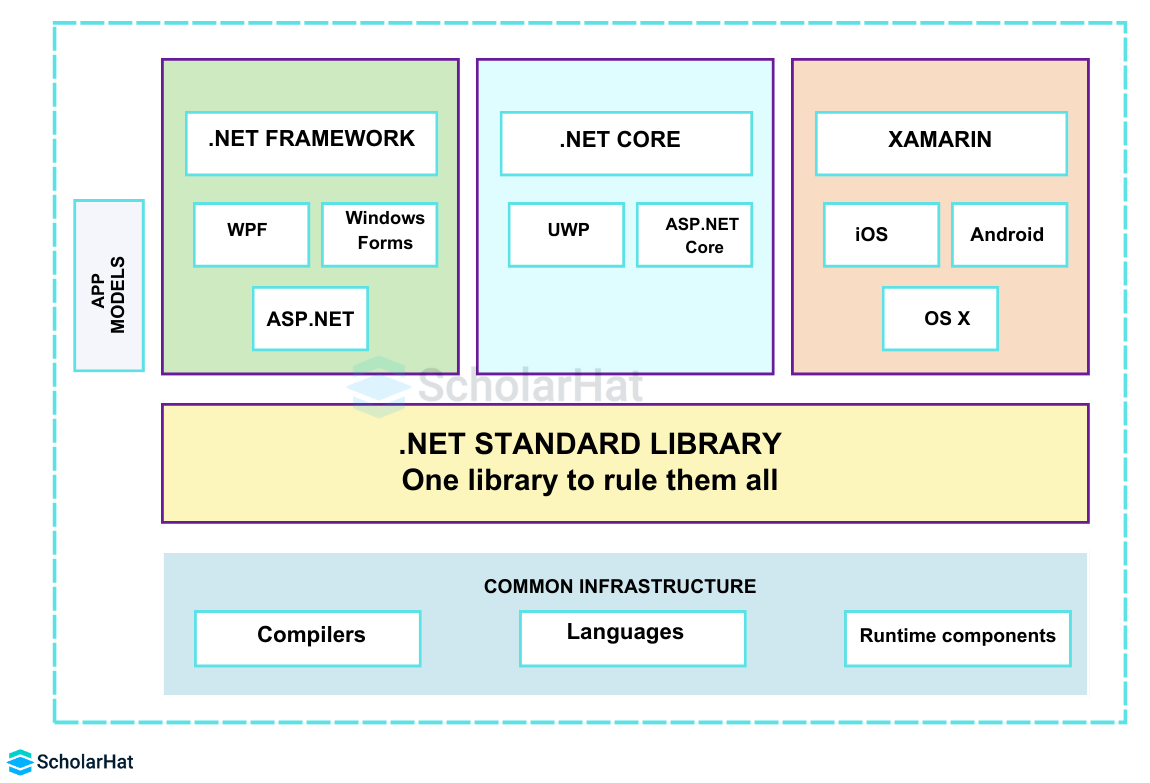
Most Important Topics to Learn in .NET
- C# Programming Language
- Variables, data types, and operators
- Control structures (if, switch, loops)
- Classes, objects, and inheritance
- Interfaces and abstract classes
- .NET Framework/Core Libraries
- Base Class Library (BCL)
- Xamarin
- ASP.NET (for Web Development)
- MVC (Model-View-Controller) pattern
- Razor syntax for views
- ASP.NET Core middleware
- Entity Framework (for Data Access)
- LINQ (Language-Integrated Query)
- Object-Relational Mapping (ORM)
- Code-First and Database-First approaches
- Windows Presentation Foundation (WPF)
Best Resources to Learn .NET
We have chiseled out some of the best sources to help a beginner or a professional learn this rich framework.
- .NET Documentation
- ASP.NET Documentation
- ASP.NET Core Documentation
- C# Documentation
- Let's Learn .NET
- Front-end Web Development with .NET for Beginners
- Back-end Web Development with .NET for Beginners
- C# Fundamentals for Absolute Beginners
- C# 101
Along with this, ScholarHat offers you the below learning resources to master your .NET framework basics and advanced
- .NET Tutorial For Beginners
- ASP.NET Core Tutorial For Beginners
- C# Tutorial For Beginners
- ASP.NET Core Course
- ASP.NET MVC with WebAPI Course
- C# Programming Course
- Full-Stack .NET Developer Certification Training Program
- .NET Developer Training With Certification
- ASP.NET Core Certification Training
- Advanced Full-Stack .NET Developer Certification Training
Career Path in .NET
There are ample opportunities for a .net developer in today's world. The career profile is very good if you are skilled and updated with the ongoing trends. The requirement is to select a specific domain or area of focus, such as web development, desktop apps, mobile applications, game development, IoT (Internet of Things), etc. Let us look into the career progression for a .NET developer:
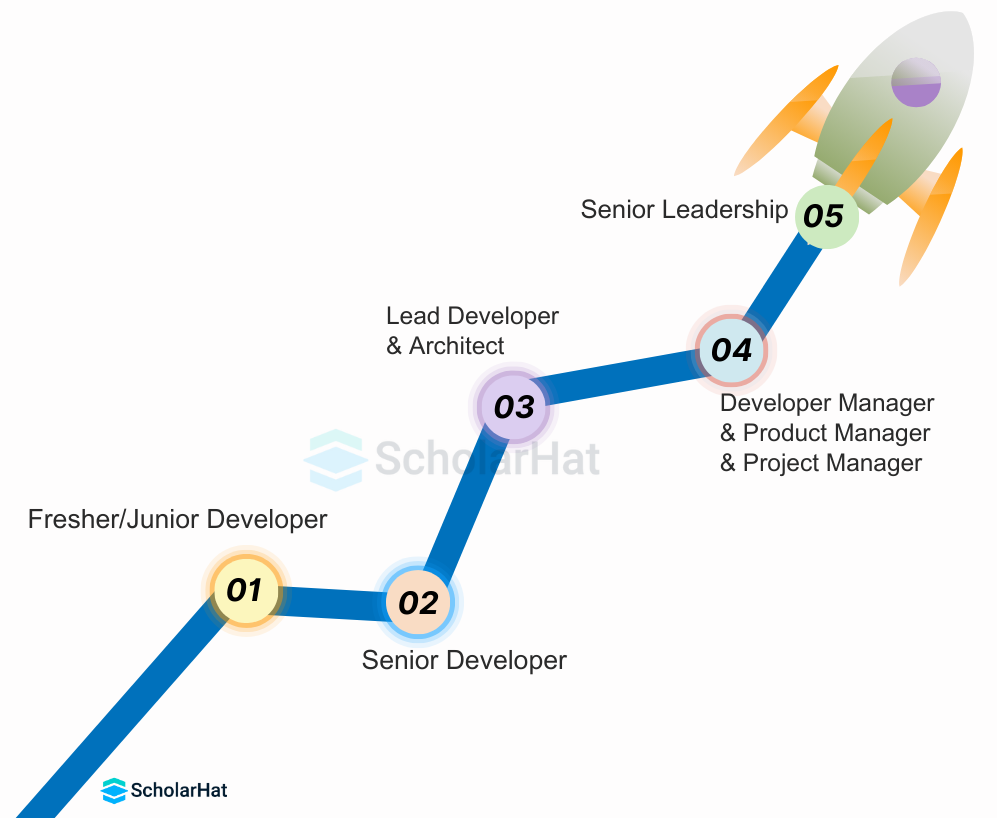
- Junior .NET Developer: They are entry-level professionals having foundational knowledge of the .NET framework and its associated technologies. They work under the guidance of senior developers, contribute to development tasks, and gain hands-on experience by working on projects.
- Mid-Level .NET Developers: They take on more complex tasks, design and implement features, collaborate with cross-functional teams, and contribute to the architecture and design decisions of software projects.
- Senior .NET Developer: They have extensive experience and expertise in .NET development, along with strong problem-solving and leadership skills. They lead development teams, mentor junior developers, and provide technical guidance and support.
- Technical Lead/Architect: These are senior-level professionals responsible for defining the technical vision, architecture, and design principles of software projects. They oversee the entire development lifecycle, collaborate with stakeholders to understand business requirements and guide the implementation of scalable and maintainable solutions.
- Development Manager/Director: They manage development teams, define project goals and priorities, establish best practices and processes, oversee resource allocation, budgeting, and project timelines, and ensure the successful delivery of software projects.
- Specialization and Advanced Roles: .NET Developers may choose to specialize in specific areas of .NET development, such as web development, mobile development, cloud computing, or data science. They may pursue advanced roles such as DevOps engineer, cloud architect, data engineer, security specialist, etc.
- Entrepreneurship and Consulting: Experienced .NET developers may explore entrepreneurship opportunities by starting their own software development companies, consulting firms, or freelance businesses.
Future of .NET
With the unification of the .NET ecosystem under .NET 5 and subsequent versions, Microsoft has laid a solid foundation for the platform's growth and expansion. .NET's cross-platform support and open-source nature have significantly expanded its reach, enabling developers to build and deploy applications on Windows, Linux, macOS, and in cloud environments with ease. This flexibility empowers developers to leverage the power of .NET in diverse environments, driving innovation and collaboration within the community.
With a vibrant and engaged community, open-source projects, and a wealth of resources available, .NET remains a versatile and powerful platform for building a wide range of applications across different domains and platforms. As technology landscapes continue to evolve, .NET is poised to remain at the forefront of software development, driving innovation and empowering developers to build the next generation of transformative applications.
Read more:
- .NET8 Developer Roadmap for 2025
- What is the difference between .NET 7 and 8?
- What's new in .NET 8? Discover ALL .NET 8 Features
- Why a Tech Stack .NET Developer Should Upskill?
FAQs
There are ample opportunities for a .NET developer in today's world. The career profile is very good if you are skilled and updated with the ongoing trends.
- Common Language Runtime (CLR)
- Base Class Library (BCL)
- .NET Framework Class Library (FCL)
- Languages and Compilers
- Integrated Development Environments (IDEs)
- ASP.NET and ASP.NET Core
- Entity Framework
- NuGet Package Manager
- C#
- Visual Basic .NET (VB.NET)
- F#
- IronPython and IronRuby
- Managed C++
Take our Net skill challenge to evaluate yourself!

In less than 5 minutes, with our skill challenge, you can identify your knowledge gaps and strengths in a given skill.






